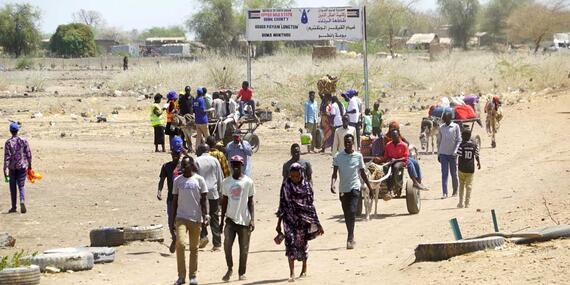Today's top news: Sudan, Ukraine

Sudan
Over the past four weeks, OCHA has facilitated the movement of 438 trucks carrying some 17,000 tons of aid to different parts of Sudan. Fifty of those trucks moved during the first two days of the latest ceasefire.
OCHA and its partners will continue to deliver, ceasefire or not. But they continue to call for an end to the fighting so that they can reach all people in need in Sudan, wherever they are.
Meanwhile, OCHA is alarmed by the impact that attacks on health care is having on women and girls in the country. The World Health Organization and UN Population Fund say more than two-thirds of hospitals are closed in areas affected by the fighting. Several maternity hospitals are also out of action.
Of the more than two-and-a-half million women and girls of reproductive age in Sudan, nearly 263,000 are estimated to be pregnant. One third of them will give birth in the next three months. And all of them need access to critical reproductive health services.
As the fighting continues in Sudan, the number of people internally displaced by the violence has risen to nearly 2 million, according to the International Organization for Migration. The highest proportions of internally displaced persons have been observed in West Darfur, River Nile, White Nile, and Northern states.
Ukraine
The senior humanitarian on the ground, WFP Representative and Country Director, Matthew Hollingworth, condemned an attack on Kherson yesterday that killed and injured rescue workers from the State of Emergency Service of Ukraine. Mr. Hollingworth recalled that this incident was yet another example of the human impact of Russia's invasion of Ukraine and reminded about the obligations to protect civilians, including rescue workers, under international humanitarian law.
On the response front, OCHA and its humanitarian partners continue to work non-stop to assist people impacted by the devastation caused by the destruction of the Kakhovka Dam, complementing the remarkable work being carried out by volunteers, in addition to the Government response.
Two weeks on since the disaster, UN agencies and humanitarian partners organized 12 inter-agency convoys, including two by boat and amphibious trucks, delivering 50 truckloads of vital supplies to help people in the Kherson Region and those living in the Dnipro Region, where access to drinking water is extremely limited due to the disaster. This is addition to the assistance provided separately by UN agencies and NGOs.
Overall, and across all affected areas, the UN and its partners delivered over 2 million litres of water, 130,000 ready-to-eat food rations, hygiene items, medical supplies, shelter kits sleeping bags, blankets, and other necessities essential items. This is in addition to medical services, counselling, legal services, and cash assistance. Over 2 million people were also reached with mine-awareness campaigns.
